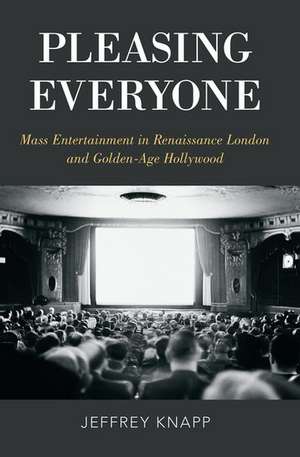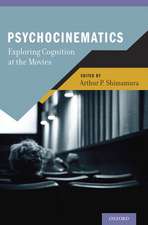Pleasing Everyone: Mass Entertainment in Renaissance London and Golden-Age Hollywood
Autor Jeffrey Knappen Limba Engleză Paperback – 24 ian 2019
| Toate formatele și edițiile | Preț | Express |
|---|---|---|
| Paperback (1) | 165.39 lei 31-37 zile | |
| Oxford University Press – 24 ian 2019 | 165.39 lei 31-37 zile | |
| Hardback (1) | 302.90 lei 31-37 zile | |
| Oxford University Press – 23 feb 2017 | 302.90 lei 31-37 zile |
Preț: 165.39 lei
Preț vechi: 189.58 lei
-13% Nou
Puncte Express: 248
Preț estimativ în valută:
31.68€ • 32.63$ • 26.53£
31.68€ • 32.63$ • 26.53£
Carte tipărită la comandă
Livrare economică 11-17 februarie
Preluare comenzi: 021 569.72.76
Specificații
ISBN-13: 9780190935924
ISBN-10: 0190935928
Pagini: 312
Ilustrații: 129 illustrations
Dimensiuni: 234 x 155 x 20 mm
Greutate: 0.48 kg
Editura: Oxford University Press
Colecția OUP USA
Locul publicării:New York, United States
ISBN-10: 0190935928
Pagini: 312
Ilustrații: 129 illustrations
Dimensiuni: 234 x 155 x 20 mm
Greutate: 0.48 kg
Editura: Oxford University Press
Colecția OUP USA
Locul publicării:New York, United States
Recenzii
Jeffrey Knapp's Pleasing Everyone: Mass Entertainment in Renaissance London and Golden-Age Hollywood persuasively argues that the size of theatre audiences and the popularity of printed playbooks mean that Renaissance drama should be classed as mass entertainment...Knapp avoids the trap of making generalizations about two very different time periods, carefully historicizing his analysis of plays and film alike. The comparison between Renaissance drama and goldenage Hollywood forces us to re-evaluate modern attitudes to popular entertainment and mass media. For the early modern scholar, Knapp's monogram offers a welcome reminder that Renaissance drama was not only popular but often populist.
Knapp has written one of the most interesting books about Shakespeare and film precisely because it isn't a study of Shakespeare on film, thereby revealing some highly original insights about both forms.
An important and eminently readable book whose central hypothesis needs to be taken seriously by anyone who entertains an interest in Renaissance drama or popular entertainment of whatever guise
In taking on the theater/film dyad, Knapp strikes at the heart of many of the theoretical foundations of the entire field of cinema studies itself, patiently eroding the apparent self-evidence of terms such as 'mass,' 'entertainment,' 'art,' 'modernity,' and 'technology,' by giving them a different history and by showing, through a series of tour-de-force close readings, how that history has been shaped and reflected upon by plays and films themselves. Pleasing Everyone is a game-changer, bringing to cinema and media studies a salutary shift in frame of reference that will be the source of much study and debate."- James Schamus, James Schamus, director (Indignation), producer (Brokeback Mountain), screenwriter (The Ice Storm), Columbia University
With its original critical and historiographical strategies and meticulous scholarship, Pleasing Everyone is a remarkable achievement. Knapp's acute comparative analyses of the performance cultures of Shakespeare's London and Hollywood's 'Golden Age' and sophisticated, lively readings of films and plays make this an outstandingly engaging and stimulating read."- Russell Jackson, author of Shakespeare and the English-Speaking Cinema, University of Birmingham
What happens when, putting our high-toned Renaissance drama next to our lowdown Hollywood cinema, we think them together? In Jeffrey Knapp's strongly argued new study, the outcome is an original-and highly usable-conception of 'mass entertainment' in which art and junk, individual and mass, author and collaboration are always inseparable in their dialectical play. For all its immortal verses, the drama proves as fully invested in the business of popular entertainment as anything that came after it; and despite its programmatic accessibility, the cinema acquires an artistic credibility that makes talk of 'authors' and 'self-reflection' necessary categories of analysis. The intricate readings that carry this argument forward are so fresh that even practiced critical hands may feel they are discovering The Winter's Tale or Citizen Kane for the first time."- D.A Miller, author of The Novel and the Police and Hidden Hitchcock, University of California, Berkeley
In his ingeniously designed chapters on work and play, Knapp puts the Puritanism of early modern antitheatrical discourses, which argued that the commercial theater disguis ed play as work, into productive tension with the elitism of Adorno and Horkheimer, who argued that commercial cinema threatened to disguise work as play. Because the book, like it objets, balances tension with openness, even readers resisting Knapp's arguments or maintaining the assumptions he critiques, as this reader did throughout, might nevertheless be pleased - even enriched - by his virtuosic readings of these complex entertainments.
Knapp has written one of the most interesting books about Shakespeare and film precisely because it isn't a study of Shakespeare on film, thereby revealing some highly original insights about both forms.
An important and eminently readable book whose central hypothesis needs to be taken seriously by anyone who entertains an interest in Renaissance drama or popular entertainment of whatever guise
In taking on the theater/film dyad, Knapp strikes at the heart of many of the theoretical foundations of the entire field of cinema studies itself, patiently eroding the apparent self-evidence of terms such as 'mass,' 'entertainment,' 'art,' 'modernity,' and 'technology,' by giving them a different history and by showing, through a series of tour-de-force close readings, how that history has been shaped and reflected upon by plays and films themselves. Pleasing Everyone is a game-changer, bringing to cinema and media studies a salutary shift in frame of reference that will be the source of much study and debate."- James Schamus, James Schamus, director (Indignation), producer (Brokeback Mountain), screenwriter (The Ice Storm), Columbia University
With its original critical and historiographical strategies and meticulous scholarship, Pleasing Everyone is a remarkable achievement. Knapp's acute comparative analyses of the performance cultures of Shakespeare's London and Hollywood's 'Golden Age' and sophisticated, lively readings of films and plays make this an outstandingly engaging and stimulating read."- Russell Jackson, author of Shakespeare and the English-Speaking Cinema, University of Birmingham
What happens when, putting our high-toned Renaissance drama next to our lowdown Hollywood cinema, we think them together? In Jeffrey Knapp's strongly argued new study, the outcome is an original-and highly usable-conception of 'mass entertainment' in which art and junk, individual and mass, author and collaboration are always inseparable in their dialectical play. For all its immortal verses, the drama proves as fully invested in the business of popular entertainment as anything that came after it; and despite its programmatic accessibility, the cinema acquires an artistic credibility that makes talk of 'authors' and 'self-reflection' necessary categories of analysis. The intricate readings that carry this argument forward are so fresh that even practiced critical hands may feel they are discovering The Winter's Tale or Citizen Kane for the first time."- D.A Miller, author of The Novel and the Police and Hidden Hitchcock, University of California, Berkeley
In his ingeniously designed chapters on work and play, Knapp puts the Puritanism of early modern antitheatrical discourses, which argued that the commercial theater disguis ed play as work, into productive tension with the elitism of Adorno and Horkheimer, who argued that commercial cinema threatened to disguise work as play. Because the book, like it objets, balances tension with openness, even readers resisting Knapp's arguments or maintaining the assumptions he critiques, as this reader did throughout, might nevertheless be pleased - even enriched - by his virtuosic readings of these complex entertainments.
Notă biografică
Jeffrey Knapp is the Eggers Professor of English at the University of California, Berkeley. He is the author of several books, including An Empire Nowhere: England and America from Utopia to The Tempest (1992), Shakespeare's Tribe: Church, Nation, and Theater in Renaissance England (2002), and Shakespeare Only (2009).









